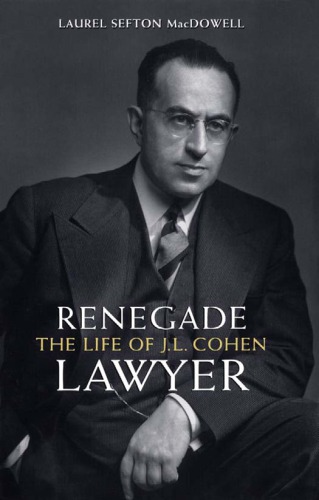

Most ebook files are in PDF format, so you can easily read them using various software such as Foxit Reader or directly on the Google Chrome browser.
Some ebook files are released by publishers in other formats such as .awz, .mobi, .epub, .fb2, etc. You may need to install specific software to read these formats on mobile/PC, such as Calibre.
Please read the tutorial at this link: https://ebookbell.com/faq
We offer FREE conversion to the popular formats you request; however, this may take some time. Therefore, right after payment, please email us, and we will try to provide the service as quickly as possible.
For some exceptional file formats or broken links (if any), please refrain from opening any disputes. Instead, email us first, and we will try to assist within a maximum of 6 hours.
EbookBell Team

4.8
54 reviewsJ.L. Cohen, one of the first specialists in labour law and an architect of the Canadian industrial relations system, was a formidable advocate in the 1930s and 1940s on behalf of working people. A 'radical lawyer' in the tradition of the great American counsel Clarence Darrow or contemporary advocate Thomas Berger who represent the less powerful and seek to reform society and to protect civil liberties, Cohen was also a 'labour intellectual' in Canada, similar to those supporting Roosevelt's New Deal in the United States. He wrote Collective Bargaining in Canada, served on the National War Labour Board during the war, and advised the Ontario government about policy issues such as mothers' allowances, unemployment insurance legislation, and labour law.
As a Marxist and a Jewish immigrant, his commitment to the labour movement resulted in part from his background and was deepened by his experience of the 1930s Depression. His was an unusual perspective for a middle class professional, and his ethnic origins and his political views subjected him to discrimination. Though respected professionally, he made enemies. At the end of the war, Cohen was convicted of a criminal charge, was disbarred and later reinstated, and died suddenly in 1950 at the age of fifty-three. Though he rose to the top of his profession, he had a difficult, complex private life that contributed to his personal disgrace and professional downfall. His obituary in the Globe and Mail described him as a dynamic, sharp-witted man who rose from humble beginnings to become the most influential labour lawyer in Canada, and it concluded with what may be a fitting epitaph, 'He championed all the wrong people in all the right things.'